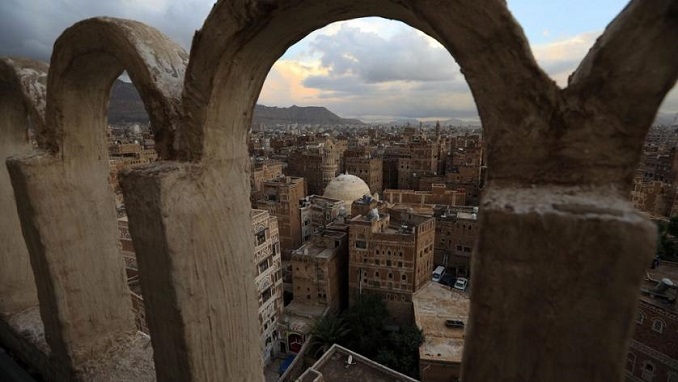Yemeni Christians, alongside the country’s Baha’i adherents and what is left of its Jewish community, face great oppression at the hands of the Houthi militia, with no better example than the fate of Mushir Khalidi, Arab News reports.
The 50-year-old priest has been imprisoned by the group’s intelligence services for four years, as part of a campaign of arrests launched by the group agains the estimated 2,000 Christians in territory it controls.
The presence of Yemen’s ancient Jewish community is all but over, with the Houthis’ insistence on deporting the last two families left in Sana’a. The militia has also deported the leaders of the Baha’i sect, while continuing to prosecute 19 members, despite its claim last year that it would pardon them after four years of detentions.
The numbers of Jews in Yemen have been dwindling with the Houthis insisting on deporting the last two remaining families from Sanaa. The militias have already expelled the leaders of the Baha’i sect, while 19 others are standing trial in spite of an amnesty they received last year following four years of trials.
Houthi intelligence continues to investigate others whose religious beliefs have not yet been disclosed, especially since most of the Yemeni converts to Christianity have already left the country.
Prior to the Houthi takeover of Sanaa, the Christians in the capital used to perform their religious practices in secret at their homes in Sanaa, Taiz and Marib, said the friends on condition of anonymity. The majority, estimated at some 2,000, have since emigrated from Yemen and moved to Beirut or Cyprus, before later moving to other countries.
Sources in the Sana’a says that the Houthi militia specifically targeted Yemeni Christians and arrested many of them, including Khalidi, a convert, who was allegedly subjected to torture in prison.
Prisoners, who were recently released from Houthi intelligence detention centers, and friends of Christians revealed to Asharq Al-Awsat that the Houthis have been cracking down on Yemenis whom they suspect of being Christian.
Khalidi’s family have avoided talking about his imprisonment for fear of repercussions against him, but one former prisoner, recently released from a Houthi jail, told Asharq Al-Awsat that he met Khalidi and others in detention, and said that the priest was arrested after the militia took control of Sana’a, saying his jailers kept him in solitary confinement for weeks at a time. He added that other Christian prisoners had been forced to recant their religious beliefs under torture.
Two of Khalidi’s friends told Asharq Al-Awsat, on condition of anonymity, that he converted to Christianity in the mid-1990s, and that the Yemeni Christian community, having previously performed religious rituals secretly in various locations in Sana’a, Taiz and Ibb, and mostly fled to Lebanon, Cyprus and elsewhere since the outbreak of war.
According to these sources, the Khalidi’s wife and his five children currently live in a rented apartment in Sana’a, and they live in fear for their lives because of the Houthi’s intolerance of other religions.
The sources say that a Houthi leader called Khaled Al-Madani handles the file of what the group describes as “manifestations of Westernization,” and his duties include, in addition to prosecuting followers of other religions, controlling the nature of work women are permitted to carry out, the regulations on wearing clothes, and gender-mixing in universities and institutes.
The Baha’i International Community issued a statement saying Houthi authorities continue to harass the minority in Yemen, terrorizing them, endangering their lives and seizing their property, citing the case of the 19 members of the sect currently on trial.
“What is happening to these 19 people is outrageous, but it has become very familiar to us,” said Diane Alaei, the representative of the Baha’i International Community to the UN in Geneva, referring to a previous case of six Yemeni Bahai’s imprisoned between 2013 and 2017, who were freed after a UN-backed campaign led to them being released, but then deported and classed as “fugitives.”
